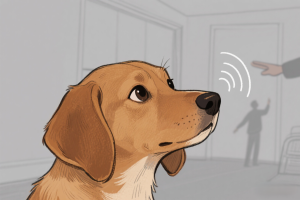Every dog has its own unique personality. Some are chatterboxes who love to bark, while others are quiet and well-behaved. Barking is one of the most important ways dogs communicate, so expecting them to never bark is as unreasonable as asking children to never speak.However, pet owners also don’t want their dog’s barking to disturb others’ daily lives. So, what can you do? First, let’s take a closer look at why dogs bark in the first place.
-
Why Dogs Bark
① Just Saying Hello
When you come home, see a stranger, meet another dog, or encounter something new, your dog might bark a few times simply to say “hello.” As humans’ most loyal companions, dogs have a strong sense of territory. Their protective instincts also drive them to bark when they hear footsteps in the hallway or when strangers approach, as a way to signal “stay away” and guard their space.
② Expressing Emotions
Dogs often instinctively bark to express emotions. For example, when they see you picking up the leash to go out, holding a handful of dog food, or when something startles them, barking becomes their natural way to show how they feel.
③ Seeking Attention
When the owner is busy doing something else and ignores them, dogs may bark to get your attention and invite you to play. Their goal is simple: make sure you notice them.
④ Excess Energy
Dogs that have been cooped up at home all day can become restless. When you come home but don’t take them for a walk or play with them, and instead just scroll on your phone, all that pent-up energy and frustration gets expressed through barking.

-
How to Reduce Your Dog’s Barking
① The Ignoring Method
One main reason dogs bark is to attract their owner’s attention. Whether you praise them or scold them, any reaction fulfills their goal. To correct excessive barking, owners should try to ignore the behavior completely. Wait until the dog calms down on its own. Once it’s quiet, you can then apply the Positive Reinforcement Method.
② The Exercise Method
Dogs also bark out of boredom or pent-up energy when left alone. The best solution is to expend that excess energy. A tired dog simply doesn’t have the energy to keep barking. Before leaving the house, take your dog for a walk or a run in the park. After adequate exercise, your dog will return home calm and ready to rest quietly.
③ Positive Reinforcement Method
Once the dog is quiet, reward them with praise, treats, or toys. This helps the dog realize that barking does not achieve their goals—only being calm and quiet gets them what they want. Repeated training will gradually reduce barking. Keep in mind, this is a long-term process that requires patience and consistency from the owner.
④ Attention Diversion Method
Play with your dog at home using toys to burn off energy. If you don’t have enough time, provide a variety of toys so your dog can entertain itself. Keeping their mind and body engaged helps prevent excessive barking due to boredom.
While enjoying warm moments with your dog, it’s important to consider how barking might disturb your neighbors. If your dog starts barking excessively, try the methods mentioned above. Following these tips can help maintain a peaceful and friendly relationship with those around you.





